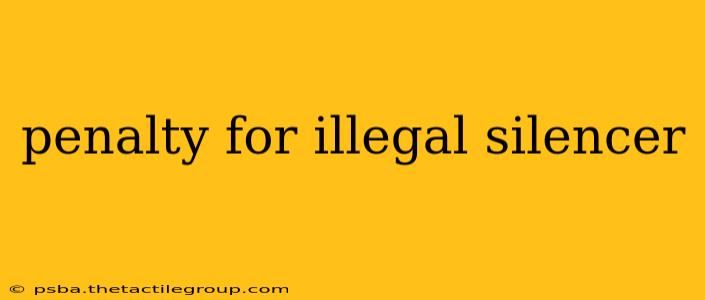The penalties for possessing or using an illegal silencer (also known as a suppressor) vary significantly depending on your location and the specifics of the offense. This guide provides a general overview, but it's crucial to consult with legal counsel for advice specific to your situation and jurisdiction. Ignorance of the law is not a defense.
Federal Penalties in the United States
In the United States, the National Firearms Act (NFA) regulates silencers and other firearm accessories. Possessing an unregistered silencer is a serious federal crime, carrying substantial penalties. These can include:
- Imprisonment: Potential prison sentences range from years to decades, depending on factors like prior offenses and the circumstances surrounding the illegal possession.
- Significant Fines: Expect substantial monetary penalties, potentially reaching hundreds of thousands of dollars.
- Criminal Record: A felony conviction will have lasting consequences, impacting employment, travel, and other aspects of life.
State-Level Penalties
Beyond federal laws, many states have their own regulations regarding silencers. These state laws can add to or even exceed the federal penalties. For example, some states may have stricter registration requirements or harsher penalties for unlawful possession. It's vital to research the specific laws in your state.
Factors Influencing Penalties
Several factors can influence the severity of the penalties you face:
- Intent: The judge will consider your intent in possessing the illegal silencer. Was it for malicious purposes, or was it a case of unintentional oversight or ignorance?
- Prior Offenses: A history of criminal activity, particularly involving firearms, will almost certainly lead to harsher penalties.
- Cooperation with Authorities: Cooperation during the investigation can potentially mitigate the sentence.
- Circumstances of the Offense: The specifics of how the illegal silencer was obtained and used will be considered.
Understanding the NFA
The NFA is complex, and understanding its nuances is crucial for legal compliance. Key aspects include:
- Registration: Silencers must be registered with the Bureau of Alcohol, Tobacco, Firearms and Explosives (ATF). Failure to register is a significant offense.
- Transfer Restrictions: The transfer of silencers is strictly regulated and requires adherence to specific procedures.
- Manufacturing and Importation: Manufacturing and importing silencers without the proper licenses are also federal crimes.
Seeking Legal Counsel
Navigating the legal complexities of silencer possession is best done with professional legal assistance. An experienced attorney specializing in firearms law can explain the specific charges, potential penalties, and advise on the best course of action. This is especially important if you are facing charges related to an illegal silencer.
Disclaimer:
This information is for educational purposes only and should not be considered legal advice. The laws surrounding silencers are intricate and vary by jurisdiction. Consult a qualified attorney for advice tailored to your specific circumstances. This information does not constitute an endorsement of or opposition to any particular laws or policies.

